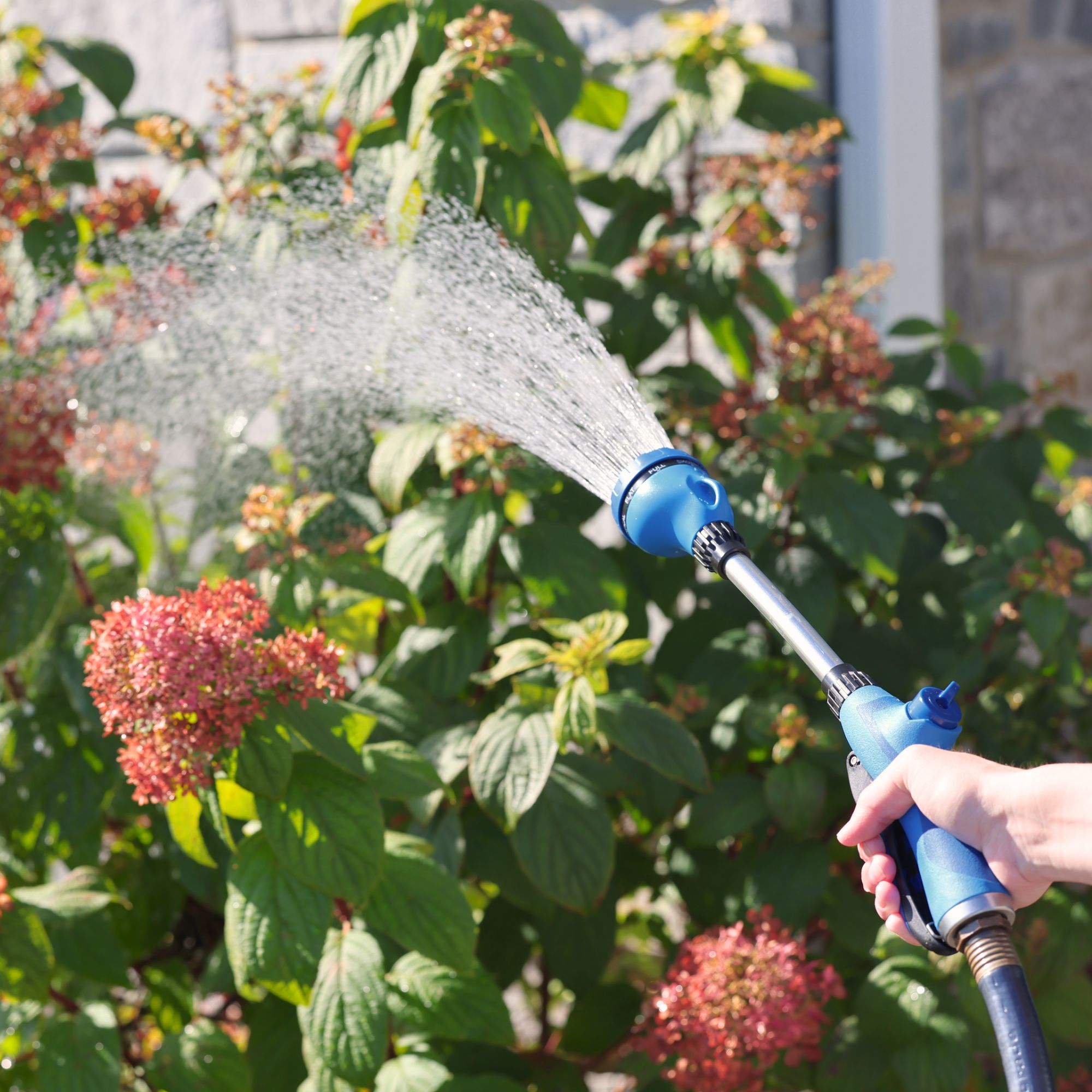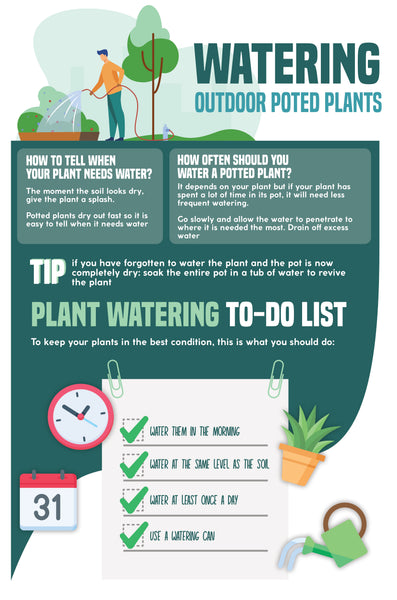As an Amazon Associate, I earn from qualifying purchases.
Outdoor plants do not need to be watered every day. Watering frequency depends on the plant type and weather conditions.
Watering outdoor plants can be tricky due to varying factors like plant species, soil type, and climate. Some plants thrive with daily watering, while others prefer less frequent hydration. Overwatering can be as harmful as underwatering, leading to root rot and other issues.
It’s essential to observe your plants and adjust watering schedules accordingly. Morning watering is often best, allowing plants to absorb moisture before the heat of the day. Consistent, deep watering encourages strong root systems. Proper watering practices ensure that your outdoor plants remain healthy and vibrant, contributing to a lush and beautiful garden.

Credit: www.amazon.com
Importance Of Watering
Watering outdoor plants is crucial for their survival and vitality. Proper hydration helps plants thrive, ensuring they remain healthy and robust. Let’s explore the importance of watering in detail.
Plant Health
Healthy plants need regular water to stay strong. Water transports essential nutrients from the soil to the plant. This helps in building strong roots, stems, and leaves.
Insufficient water can lead to wilting, yellow leaves, and weak growth. Overwatering can also harm plants, causing root rot and fungal issues. Hence, finding a balance is key.
Growth And Development
Water is vital for a plant’s growth and development. It helps in photosynthesis, the process by which plants make food. Without water, plants cannot grow properly or produce flowers and fruits.
Regular watering supports the expansion of plant cells, enabling them to grow larger and stronger. Young plants, in particular, need more water for their rapid growth phases.
Below is a table summarizing water needs for different growth stages:
| Growth Stage | Water Needs |
|---|---|
| Seedling | High |
| Mature Plant | Moderate |
| Flowering | Varies |
Watering frequency may vary based on weather, soil type, and plant species. It’s important to monitor your plants and adjust watering schedules accordingly.
- Check soil moisture before watering.
- Water early in the morning for best results.
- Avoid wetting leaves to reduce disease risk.
Regular and appropriate watering ensures your outdoor plants remain vibrant and healthy.
Factors Affecting Water Needs
Outdoor plants do not always need to be watered every day. The water needs of your plants depend on several factors. Understanding these factors helps you provide the right amount of water.
Climate And Weather
Climate plays a big role in plant water needs. Hot and dry climates require more frequent watering. In contrast, cooler and humid climates need less water.
Weather conditions also matter. Rainy days reduce the need for watering. Sunny and windy days increase water evaporation, so plants need more water.
Soil Type
The type of soil affects how often you should water your plants. Sandy soil drains quickly and needs frequent watering. Clay soil holds water longer and requires less frequent watering.
Loamy soil is ideal for most plants. It retains moisture well but also drains properly. Knowing your soil type helps you water your plants effectively.
Signs Of Underwatering
Knowing the signs of underwatering can help keep your plants healthy. It’s crucial to recognize these signs to prevent damage. Let’s explore the tell-tale signs your outdoor plants need water.
Wilting Leaves
Wilting leaves are a clear sign of underwatered plants. Leaves may droop and lose their vibrant color. They might also feel dry and crisp to the touch. This can happen quickly in hot weather. Regular watering can help prevent this.
Dry Soil
Dry soil is another indicator of underwatering. Check the soil by touching it. If it feels dry an inch below the surface, your plant needs water. You can use a moisture meter for more accuracy. Soil should feel moist but not soggy.
| Sign | Description |
|---|---|
| Wilting Leaves | Leaves droop and lose color. |
| Dry Soil | Soil feels dry an inch below the surface. |

Credit: melnor.com
Signs Of Overwatering
Overwatering your outdoor plants can be just as harmful as under-watering. Recognizing the signs of overwatering is crucial for plant health. Below are some common indicators that your plants are receiving too much water.
Yellowing Leaves
One of the first signs of overwatering is yellowing leaves. The leaves may start to turn yellow and look limp. This happens because the roots are suffocating from too much water. When the roots can’t breathe, they can’t absorb nutrients properly.
Check the soil moisture. If it’s soggy, your plant is overwatered. Allow the soil to dry before watering again. Consider using a soil moisture meter for accurate readings.
Root Rot
Root rot is another serious sign of overwatering. It occurs when the roots sit in water for too long. The roots begin to decay and turn black or brown.
Symptoms of root rot include:
- Foul smell from the soil
- Soft, mushy roots
- Stunted plant growth
To prevent root rot, ensure proper drainage. Use well-draining soil and pots with drainage holes.
| Signs | Cause | Solution |
|---|---|---|
| Yellowing Leaves | Excess Water | Check soil moisture, let it dry out |
| Root Rot | Waterlogged Soil | Improve drainage, use proper soil |
Best Times To Water
Finding the best times to water your outdoor plants is crucial. It helps ensure they get the right amount of hydration. Watering at the wrong time can lead to wasted water and unhealthy plants.
Morning Vs. Evening
Morning watering is often the best for outdoor plants. The temperatures are cooler, which allows the water to penetrate the soil deeply. Plants can absorb water before the sun’s heat causes evaporation.
In the evening, the temperatures drop again. This can also be a good time to water. However, wet leaves overnight can increase the risk of fungal diseases.
Seasonal Considerations
Watering needs change with the seasons. In the spring, plants begin to grow and may need more water. Warmer temperatures in the summer increase water evaporation, so more frequent watering might be needed.
During the fall, plants start to slow down their growth. They may not need as much water as in the summer. In the winter, many plants go dormant and require very little water.
| Season | Watering Frequency |
|---|---|
| Spring | Moderate |
| Summer | Frequent |
| Fall | Less Frequent |
| Winter | Minimal |
Watering Techniques
Understanding the right watering techniques for outdoor plants is crucial. Not all plants need daily watering. Some methods help save water and keep plants healthy.
Drip Irrigation
Drip irrigation is an efficient watering method. It delivers water directly to plant roots. This reduces evaporation and water waste.
This method uses a network of tubes, valves, and emitters. The emitters release water slowly. This ensures plants receive a steady supply of water.
Benefits:
- Reduces water usage
- Minimizes weed growth
- Prevents soil erosion
Tip: Place emitters close to the plant base. This ensures water reaches the roots.
Hand Watering
Hand watering is a traditional and simple method. It involves using a hose or watering can.
This technique allows you to control the water amount. You can directly target each plant’s base.
Benefits:
- Easy to monitor water usage
- Immediate control over water flow
- Suitable for small gardens
Tip: Water in the early morning or late evening. This helps reduce water evaporation.
Hand watering is ideal for new plants. It helps establish strong roots.
| Method | Benefits |
|---|---|
| Drip Irrigation | Water-efficient, reduces weeds, prevents erosion |
| Hand Watering | Direct control, easy monitoring, best for small gardens |
Choose the right method based on your garden’s needs.
Special Considerations
Watering outdoor plants daily can be tricky. Different plants have different needs. Some plants need more water. Others need less water. Here are some special considerations.
Young Plants
Young plants need more water. They have small roots. Their roots can’t reach deep water. Water them often. Keep the soil moist. Use a watering can. Be gentle. Don’t wash away the soil. Young plants are delicate. They need extra care.
Established Plants
Established plants need less water. Their roots are deep. They can reach underground water. Water them once a week. Check the soil first. If it’s dry, water the plants. If it’s wet, don’t water them. Overwatering can harm them. Use a garden hose. Water the base of the plant. Avoid wetting the leaves. Wet leaves can cause disease.
| Type of Plant | Watering Frequency |
|---|---|
| Young Plants | Daily |
| Established Plants | Weekly |
Remember these special considerations. Your plants will stay healthy. They will grow strong. Happy gardening!
Expert Tips
Wondering if your outdoor plants need daily watering? Experts say it depends. Let’s dive into some tips to keep your garden thriving.
Efficient Water Use
Watering plants can be tricky. Overwatering can harm roots. Underwatering can cause wilting. To make watering efficient, follow these tips:
- Water early in the morning: This helps plants absorb water before the sun gets too hot.
- Use a soaker hose: This delivers water directly to the roots, minimizing evaporation.
- Mulch your plants: Mulch retains moisture and reduces the need for frequent watering.
Monitoring Plant Needs
Plants have different water needs. Some plants need more water, others less. Here’s how to monitor your plants:
- Check the soil: Stick your finger into the soil. If it’s dry, water the plant.
- Look at the leaves: Wilting leaves may indicate your plant needs water.
- Observe the weather: Hot and windy days may require more frequent watering.
Keep an eye on your plants and adjust watering as needed. This will ensure they stay healthy and vibrant.

Credit: www.amazon.com
Frequently Asked Questions
Do Outdoor Plants Need Daily Watering?
Outdoor plants usually don’t need daily watering. Watering frequency depends on plant type, soil, and weather conditions.
How Often Should Outdoor Plants Be Watered?
Generally, outdoor plants should be watered 2-3 times a week. However, this can vary based on climate and soil type.
Can Overwatering Harm Outdoor Plants?
Yes, overwatering can harm outdoor plants. It can lead to root rot and other fungal diseases.
What Are Signs Of Underwatered Outdoor Plants?
Underwatered plants show signs like wilting, dry soil, and yellowing leaves. Regularly check soil moisture to avoid this.
Conclusion
Watering outdoor plants daily is not always necessary. Factors like climate, soil, and plant type matter. Observe your plants’ needs and adjust watering accordingly. Overwatering can harm plants, so it’s crucial to find a balance. Pay attention to weather conditions and soil moisture levels.
Proper care ensures healthy, thriving plants.

